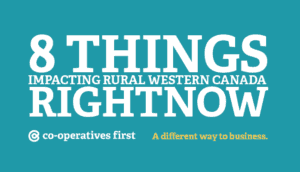All smiles after an hour long session discussing bylaws. No shortage of leadership, strength and energy with this group.
How to make co-operative incorporation more human-friendly
Building a co-operative business takes a lot of work. Coordinating people and maintaining momentum can be a lot like herding cats, and finding the delicate balance between keeping people excited about developing a business and completing the necessary co-operative incorporation documents is a tough job. These “noinky” bits require tons of dedication, a wee bit of charisma and an elephant-skin tolerance for the tedious.
Completing your co-op’s incorporation documents can be boring. We know.
One of the services Co-operatives First provides is assistance developing foundational documents, like articles of incorporation and bylaws. While our community engagement coordinators get excited by these ‘noinky’ steps in the development process, not everyone shares their enthusiasm for procedure.
Most people skim over the finer points of a notice required for shareholders to vote on a change to bylaws or the specific duties of a board chair. But these are vitally important for the successful operation of co-operative businesses. Ensuring bylaws are thorough and well-articulated can help avoid serious challenges down the road.
Some people like the “noinky” bits. Find those people and recruit them.
Take solace in the fact that some people actually like co-operative incorporation documents. Identifying these people and actively recruiting them to the business development project will help the rest of the project team focus on the parts they excel at. While everyone should engage in ensuring their needs and concerns are captured by the incorporation documents, it’s important momentum isn’t lost by getting stuck in the weeds. Allow people better off pushing other parts of the business forward to skip the details.
Not all of your co-op’s incorporation documents are sleep inducing. Highlight them.
Believe it or not, there are some organizational steps that actually engage and create excitement for all shareholders. Naming the business is one example. At a recent planning session with a Pelican Narrows steering committee and Co-operatives First, people eagerly engaged in brainstorming possible names for their business. After a great deal of excited debate and high level engagement, the group decided to incorporate under a Cree name that reflects the language of the people and land forming the business.
While detailed discussions on joint shares, withdrawal of share and termination of shares are not for everyone, by encouraging participation in the aspects that are more fun, you can maintain momentum so that people remain engaged for the “high level” incorporation discussions and can zone out for the “noinky” bits involved.
Whatever your feelings about “noinky” bits, they’re important. Sometimes getting outside help can help.
A good set of bylaws should always be a collaborative effort and reflect the co-operative’s business. But they should also respect the values that brought about the co-operative business in the first place. Always have your bylaws reviewed by legal counsel to ensure they comply with relevant legislation and to identify any procedural issues. Plus, those folks really love the “noinky” bits and should be able to locate any disagreeable details.
Free help.
If you’re struggling with your co-operative’s incorporation documents, bylaws or other process/procedural elements of building your business, there is help available. Co-operatives First community engagement coordinators are prepared to help guide you through the process of organizing and developing your co-operative business. We can also connect you with the technical resources necessary to be successful – and we offer our services for FREE. Contact us.
Helpful information
For a general guide to bylaws, check this out.
For those of you who like the “noinky” bits, here are the forms necessary to complete your co-operative business articles of incorporation:
P.S. Each province has a different set of requirements. If you’re business spans across provincial borders, you should incorporate federally.

 Written by
Written by 


